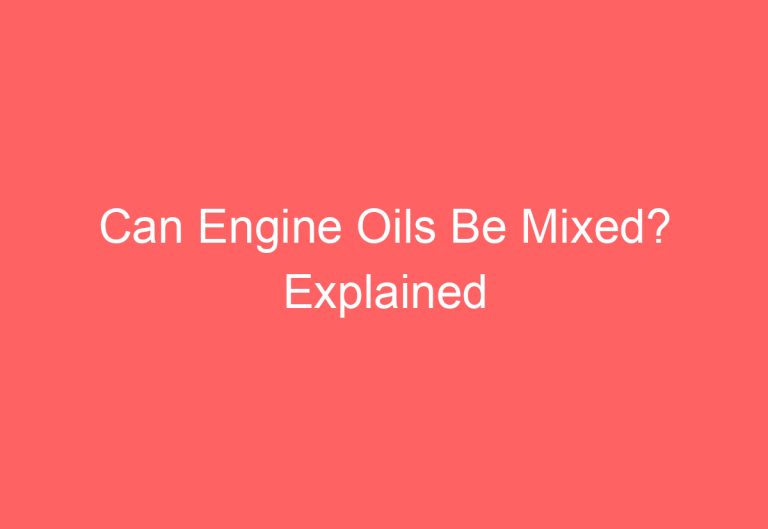Are Engine Oil Caps Universal? Exploring Compatibility and Differences
Engine oil caps are an essential component of any vehicle’s engine, as they help to keep contaminants out and prevent oil from leaking out. However, many people wonder if engine oil caps are universal, meaning if they can be used interchangeably between different vehicles. The short answer is no, engine oil caps are not universal, but there are some exceptions.

The type of engine oil cap needed for a vehicle depends on the make and model of the engine. Some engine oil caps may be compatible with multiple vehicles, but this is not always the case. Universal engine oil caps are available, but they are designed to fit a wide range of engine models and may not be the best fit for every vehicle. It is important to consult the vehicle’s owner’s manual or a mechanic to determine the correct engine oil cap for a specific vehicle.
Understanding Engine Oil Caps

Engine oil caps are an essential component of a vehicle’s engine, which helps to seal the oil reservoir and prevent leaks. These caps are not universal, and compatibility depends on various factors, including the make and model, year, and material of the engine oil cap.
Purpose and Function
The primary function of the engine oil cap is to seal the oil reservoir and prevent leaks or contaminants from entering the engine. The cap is typically located on the top of the engine and is easily accessible for regular maintenance. It also helps to maintain the oil pressure in the engine and prevents oil from splashing out of the engine during high-speed driving.
Material and Design Variations
Engine oil caps come in different materials, including plastic, metal, and rubber. Plastic caps are the most common and are usually made of high-density polyethylene or polypropylene. Metal caps are more durable and are commonly made of aluminum or steel. Rubber caps are also available, but they are less common and are usually used in older vehicles.
The design of the engine oil cap also varies depending on the make and model of the vehicle. Some caps have a simple threaded design, while others have a bayonet-style locking mechanism. The design of the cap should match the specifications of the vehicle to ensure proper fitting and sealing.
Compatibility and Specificity
Engine oil caps are not universal, and compatibility depends on the make and model of the vehicle. Some oil caps may be compatible with multiple vehicles, but it is essential to ensure that the cap is specific to the make and model of the vehicle. Using the wrong oil cap can lead to leaks, poor sealing, and engine damage.
Identifying the Right Oil Cap
To identify the right oil cap, it is essential to refer to the vehicle owner’s manual or consult with a mechanic. The manual will provide information on the make and model of the engine oil cap required. It is also essential to ensure that the cap matches the material and design specifications of the vehicle.
In conclusion, engine oil caps are not universal, and compatibility depends on various factors, including the make and model, year, and material of the engine oil cap. To ensure proper fitting and sealing, it is essential to use a cap that matches the specifications of the vehicle.
Consequences of Improper Oil Cap Use

When it comes to engine oil caps, using the wrong type of cap can have serious consequences on the engine’s health and performance. In this section, we will explore the risks of using non-universal caps, signs of oil cap failure, and preventive measures and maintenance.
Risks of Using Non-Universal Caps
Using non-universal caps can lead to oil leakage, which can cause engine damage over time. Loose or missing caps can also allow debris, dirt, and other contaminants to enter the engine, leading to engine failure. It is important to ensure that the oil cap is the correct fit for the engine to prevent any of these issues from occurring.
Signs of Oil Cap Failure
There are several signs that can indicate oil cap failure. If the cap is loose or missing, oil leakage may occur. This can be detected by checking the oil level regularly and inspecting the engine for any signs of oil leaks. A damaged or cracked oil cap can also lead to oil leakage and should be replaced immediately.
Preventive Measures and Maintenance
To prevent oil cap failure, it is important to perform regular maintenance on the engine. This includes checking the oil level regularly and inspecting the oil cap for any signs of damage or wear. If the cap is damaged or worn, it should be replaced immediately with a new, correct fit cap. It is also important to ensure that the cap is tightened properly to prevent any oil leakage.
In conclusion, using the correct oil cap is essential for maintaining engine health and performance. Regular maintenance and preventive measures can help prevent oil cap failure and ensure that the engine runs smoothly. By following these simple steps, car owners can avoid costly repairs and keep their engines running for years to come.
Frequently Asked Questions

Can I purchase a universal oil filler cap to fit my vehicle?
No, engine oil caps are not universal. They are designed to fit specific makes and models of vehicles. Using a universal oil filler cap may lead to leaks and other engine problems. It is important to find the correct oil cap for your vehicle to ensure proper fit and function.
What are the consequences of driving without an oil cap?
Driving without an oil cap can lead to oil leaks and contamination of the engine oil. This can cause damage to the engine and result in costly repairs. It is important to replace a missing or damaged oil cap as soon as possible to prevent further damage to the engine.
How can I temporarily fix a missing oil cap?
If you are unable to immediately replace a missing oil cap, you can use a temporary solution such as a plastic bag or duct tape to cover the opening. However, this is not a long-term solution and it is important to replace the oil cap as soon as possible.
Will driving without an oil cap trigger a check engine light?
Yes, driving without an oil cap can trigger a check engine light. This is because the engine control module (ECM) monitors the oil pressure and can detect a drop in pressure caused by a missing or damaged oil cap.
What is the typical cost for an oil cap replacement?
The cost of an oil cap replacement can vary depending on the make and model of your vehicle. However, in general, an oil cap replacement should be relatively inexpensive and can typically be done for under $50.
How does one properly seal an oil cap to prevent leaks?
To properly seal an oil cap and prevent leaks, it is important to ensure that the cap is clean and free of debris. The cap should be tightened securely, but not over-tightened. Over-tightening can damage the cap and cause leaks. It is also important to replace the oil cap gasket if it is damaged or worn.






